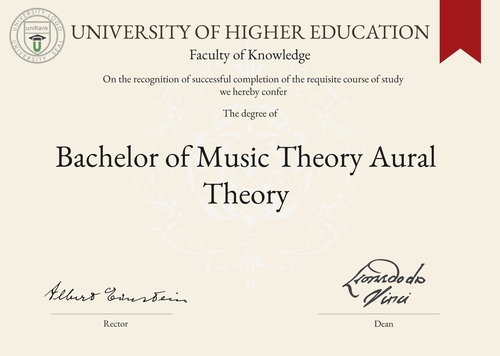
Bachelor of Music Theory Aural Theory (BMus (Music Theory Aural Theory))
Guide to University Programs/Courses
Bachelor of Music Theory Aural Theory (BMus (Music Theory Aural Theory))

Program/Course Name
Bachelor of Music Theory Aural TheoryProgram/Course Abbreviation
BMus (Music Theory Aural Theory)Duration Range
The duration of the program typically ranges from 3 to 4 years.Tuition range
The tuition fees for the program can vary depending on the country and university, ranging from $10,000 to $40,000 per year.Overview
The Bachelor of Music Theory Aural Theory program is designed to provide students with a comprehensive understanding of music theory and aural skills. It focuses on developing the ability to analyze and interpret musical compositions, as well as training the ear to recognize and understand various musical elements.Curriculum Overview by Year
- Year 1: Introduction to Music Theory, Aural Skills Fundamentals, Music History Survey- Year 2: Advanced Music Theory, Aural Skills Development, Composition Techniques- Year 3: Analysis of Musical Forms, Aural Analysis, Elective Courses (e.g., Jazz Theory, Orchestration)- Year 4: Capstone Project, Advanced Aural Skills, Specialized Topics in Music TheoryKey Components
- Music theory analysis and interpretation- Aural skills development- Composition techniques- Music history and appreciation- Elective courses for specializationCareer Prospects
Graduates of the Bachelor of Music Theory Aural Theory program can pursue various career paths, including:- Music theory and aural skills instructors- Music composers and arrangers- Music critics and journalists- Music researchers and scholars- Music consultants for film, television and multimedia industriesSalary Expectations
The salary expectations for graduates can vary depending on factors such as location, experience and job position. On average, music theory and aural skills instructors earn between $30,000 and $60,000 per year, while music composers and arrangers can earn between $40,000 and $80,000 per year. For a more accurate understanding of salary expectations, you can utilize the Job Sites Search Engine, from our sister site jobRank, which searches over 4,600 job sites worldwide. Make sure to specify not only the job title but also the country you are interested in.Conclusions
It is important to note that the duration, tuition fees, curriculum, key components, career prospects and salary expectations of the Bachelor of Music Theory Aural Theory program can vary depending on the chosen country or location of study, as well as the chosen university. Prospective students are encouraged to research and compare different universities and countries to find the best fit for their educational and career goals. Visitors can search for institutions offering the Bachelor of Music Theory Aural Theory program worldwide through the uniRank World Universities Search Engine.World Universities Search Engine
search for Bachelor of Music Theory Aural Theory (BMus (Music Theory Aural Theory)) and add the Location (country, state etc.) or specific University you are interested in studying at.
Query examples:
- Bachelor of Music Theory Aural Theory (BMus (Music Theory Aural Theory)) United States
- Bachelor of Music Theory Aural Theory (BMus (Music Theory Aural Theory)) United Kingdom online
- Bachelor of Music Theory Aural Theory (BMus (Music Theory Aural Theory)) Australia international students
- Bachelor of Music Theory Aural Theory (BMus (Music Theory Aural Theory)) University of California
- Bachelor of Music Theory Aural Theory (BMus (Music Theory Aural Theory)) University of London tuition fees
- Bachelor of Music Theory Aural Theory (BMus (Music Theory Aural Theory)) University of Sydney scholarships